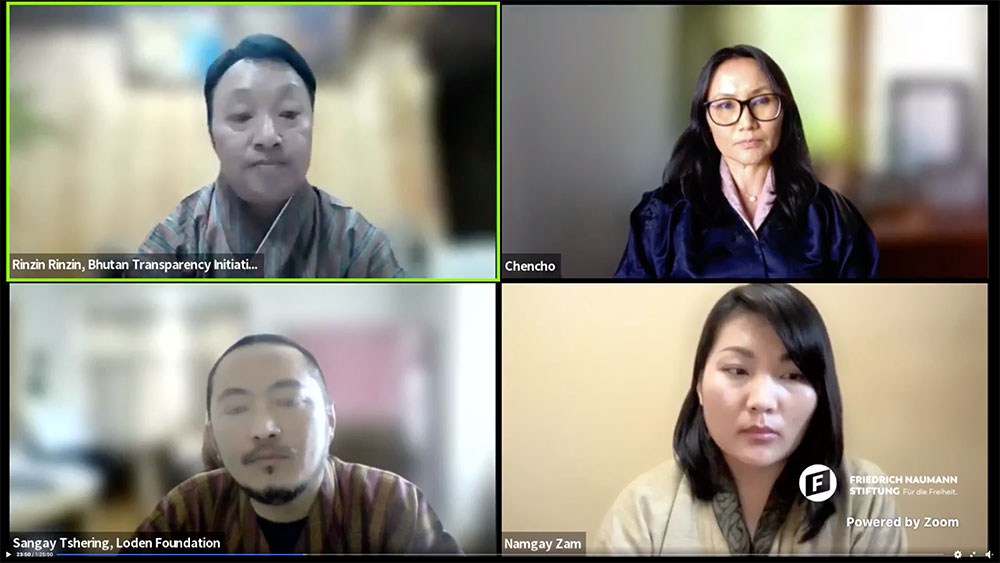Staff Reporter
With very limited avenues to garner support at home, Bhutan Civil Society Organisations have no alternative but to look for donors outside, at least for the near future, according to members of the CSOs.
The Chairperson for the Bhutan Civil Society Network and the Executive Director of Bhutan Transparency International, Rinzin Rinzin (PhD), said that most CSOs in the country had no exposure and needed to learn from other countries. When it comes to funding CSO, Nordic countries where the government contributes certain percent of its budget for CSOs. But its not possible in our country, he said, the resource constraints.
He was among the three prominent members of the CSOs, who highlighted the challenges and opportunities for them at a in a webinar last week moderated by freelance journalist and former Journalists Association of Bhutan’s Executive Director, Namgay Zam.
Loden Foundation Executive Director Sangay Tshering said that there is also the possibility the private sector funding CSOs.
“I have reached out to private sectors and they are willing to help. The economy went bust right now. Right now everyone is looking for some kind of assistance. When economy becomes stable then they would definitely help,” said Sangay Tshering, who also runs a private IT firm.
However, they said that the question of foreign funding as foreign interference would not be an issue.
The Executive Director of Bhutan Centre for Media and Democracy, Chencho Lhamu (PhD) said that ff CSO are involved in making policies and recommendation, propose policies its justifying existence of CSOs. “I think all CSOs across the world are aware of foreign interference and CSOs to work in policies it is a matter of explaining the need and demonstrating need for policy change,” she said.
Rinzin Rinzin said, “I don’t think government will perceive as interference from the CSO but CSO must also be mindful that we should be doing things how things should be done. While we were talking with MP they were interested in hearing our concerns.”
Chencho Lhamu said that to certain extent CSOs are much more inclusive and inclusive towards diversity. “Within CSOs we are much more open. There are CSOs for LGBTI+. If you ask if we are advocating women’s right enough then I would say that is where we need to improve.”
According to the panellists, CSOs needed a space where they could contribute to policy making mainly through recommendations and their expertise.
They said that one of the challenges for the CSOs is the migration of skilled workers that is affecting the completion of their tight-deadline projects. And that Bhutanese CSOs were working towards liberalising the system and economy essential to curb the “brain-drain”.
Sangay Tshering said that CSOs are trying. “But is it enough? Its not enough because some entrepreneurs we have supported went to Australia. Will they return? They are in Australia and they have started paying back.”
He said that the question is whether they will able to pay loan when in Bhutan. “They could not.”
“There is a need to diversify economy. Can CSO do it? Yes, we could but how do we do it? I think that’s why we are having the discussion today,” Sangay Tshering said.
Rinzin Rinzin said that visibility of CSO has been improving. Media seems to understand CSO much better and they are interested to promote the CSOs. Now media understand us and people know us. I need to emphasise it.”
Chencho Lhamo said that over the years CSOs in Bhutan have become much more organised. “We share sense of solidarity among us. But are we perfect? No. All depend on donors. As long as CSOs depend on donors perfect coordination is not very possible. It’s not utopia.”
She said that Bhutanese people contribution to CSOs is negligible. “Bhutanese people are generous to offer to religious activity and health related. In areas of CSO in governance not much. Our work does not give immediate result, it takes time. It’s time for Bhutanese people to re-think.”
Friedrich Naumann Foundation’s Regional Office South Asia organised the webinar “Empowering Bhutan’s Civil Society: Overcoming Challenges and Finding Solutions”.
The regional office head, Carsten Klein (PhD) said that in general, Bhutan was amongst role model in the region. “It also is a country where many people in the region take most interest in which I think is important in growing CSO in Bhutan.”
“For a prosperous CSO there is need of a proper legal framework, reliable finance, good social support, and international network like you mentioned,” he said.
He said that the foundation would help to throw more light on the Bhutanese CSOs by providing more networks.


